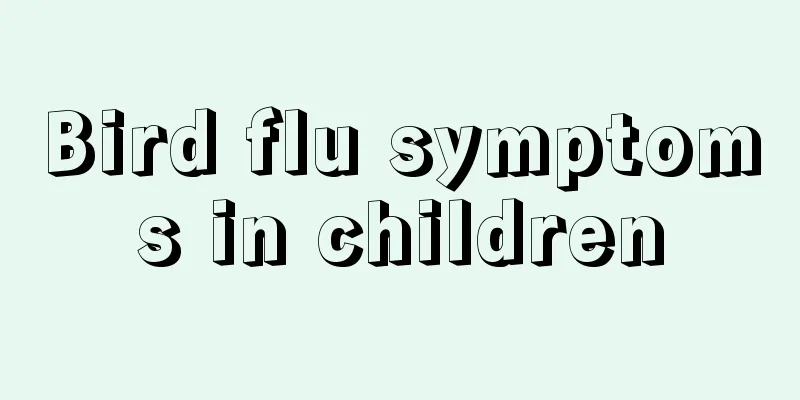What is considered diarrhea in babies?

|
Babies usually cannot speak before the age of two. They can only express their discomfort through crying, and parents need to observe carefully. Diarrhea in babies is a very common phenomenon, but for new parents, they often don’t know what the symptoms of diarrhea are. In fact, it is very important for parents to learn these, so that some diseases can be discovered early. So what does it mean for a baby to have diarrhea? What is diarrhea for babies? Infant diarrhea is a clinical syndrome caused by different causes. It mainly occurs in infants under 2 years old. Newborns usually have up to 10 bowel movements a day, but as they get older this may range from a few times a day to once or twice a week. First, you need to understand your baby’s normal bowel habits so that you can determine whether it is diarrhea at the first time. The main symptoms are: 1. Mild symptoms: five to eight bowel movements a day, possibly accompanied by a mild fever or vomiting. The stool is yellow-green, mucus-containing and egg-drop soup-like, accompanied by mild abdominal distension and hyperactive bowel sounds. 2. Moderate diarrhea: Ten bowel movements a day, loose watery stools, sour and smelly, and possible moderate fever. 3. Severe cases: frequent diarrhea, eight to fifteen bowel movements a day, watery and large in volume, with a sour odor, irritability, drowsiness, listlessness, and even coma and convulsions, bloody and mucous stools, sunken anterior fontanelle, dry skin and lips, etc. 4. Some patients may experience obvious dehydration, acidosis, and electrolyte imbalance, such as hypokalemia or hypomagnesemia. Causes of diarrhea in babies 1. Gastroenteritis. It is common in both adults and children. It is an inflammation of the stomach and intestines that can easily lead to diarrhea. The pathogens that cause gastroenteritis are mostly viruses, the most common of which is rotavirus, which occurs frequently in late autumn and early winter. Half of the babies hospitalized for diarrhea are infected with this virus. If a baby has diarrhea accompanied by stomach cramps, vomiting, and low fever, it is likely caused by gastroenteritis. 2. Bacterial infection. If your baby has severe diarrhea (sometimes accompanied by vomiting) and also has abdominal pain, bloody stools, fever, etc., it is often caused by bacteria (such as E. coli, Salmonella, etc.). Some of these infections are self-healing, but some can be very serious (such as infections caused by E. coli in undercooked meat). Therefore, if your baby has the above symptoms, take him to see a doctor immediately. 3. Parasitic infection. Parasitic infections may also cause diarrhea in babies. For example, giardiasis (also called "pir-shaped flagellation") is caused by a parasite that lives in the intestines and can only be seen under a microscope. Therefore, practicing good hygiene habits, such as washing hands after changing diapers, is the best way to stop the spread of parasitic infections. What counts as diarrhea in babies? We must first understand the symptoms of diarrhea in babies. The main symptoms are loose stools, increased frequency of bowel movements, poor appetite, poor spirits, and constant crying. If the baby has diarrhea, the mother should pay attention to replenishing the baby with water. Diarrhea can easily lead to dehydration. The mother must not be careless and go to the hospital in time if necessary. |
<<: What to do if a four-month-old baby has diarrhea due to a cold stomach
>>: Baby has diarrhea and anal ulcer
Recommend
Is it OK for a baby to sleep on his tummy?
Like adults, babies’ sleeping positions are very ...
What are some tips for solving baby’s runny nose?
A runny nose is usually a sign of a cold, but the...
When is the best time for young children to brush their teeth?
Many times, first-time mothers wonder at what age...
How to deal with inflammation and pus discharge in newborn baby's navel
If the umbilical cord of a newborn falls off late...
What are the benefits of children learning street dance?
Every child is the hope of a family and carries t...
What to do if your newborn baby hiccups continuously
Since newborns have different resistance to infec...
Causes of Henoch-Schonlein Purpura Nephritis in Children
Children's health is a problem that parents a...
The child fell off the sofa
Children will fall when they are young. Because c...
What should I do if my child has tooth worms?
Many children have tooth decay due to better livi...
Height standard for babies between two and three years old
I believe that the baby's physical health is ...
Does pacifier have any effect on children?
Nowadays, many mothers actually insist on breastf...
Why does a child have a fever and cold hands and feet?
We will encounter many situations when taking car...
Children often shake their heads
Children often change their postures when they sl...
Treatment for diarrhea caused by cold in babies
Babies catching cold and having diarrhea looks ve...
What are the correct ways for children to wash their hands?
Many young children do not wash their hands frequ...









